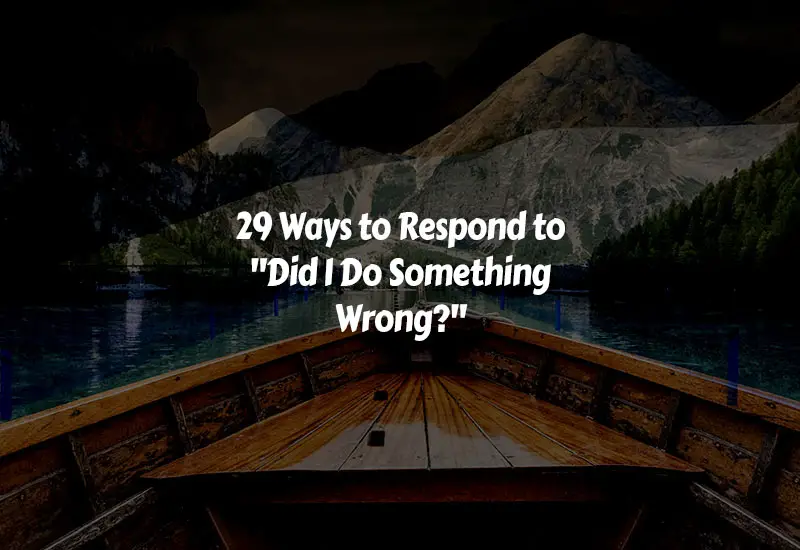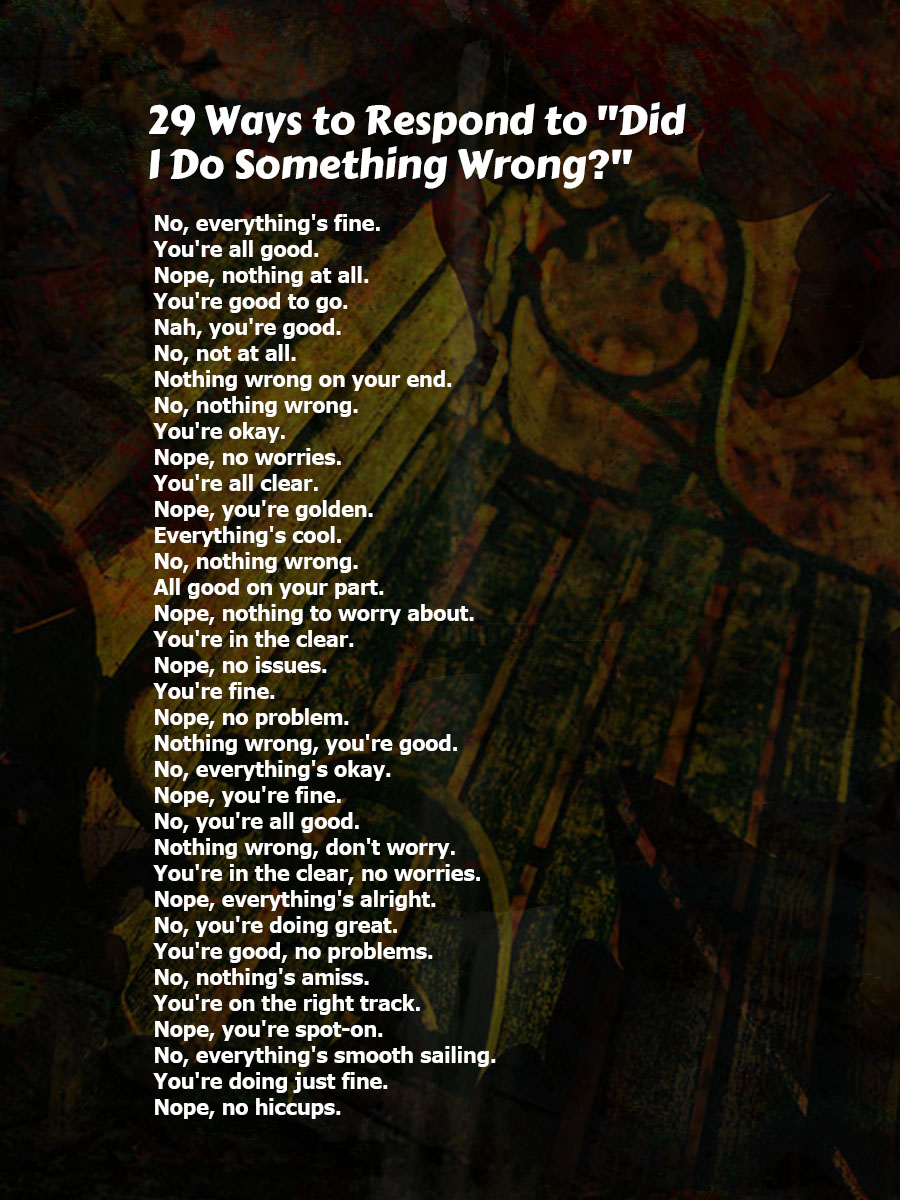Have you ever been asked, ‘Did I do something wrong?’ It’s a common question that can make us feel unsure about how to respond. In this article, we’ll explore different ways to handle this situation kindly and effectively. Whether it’s a friend, family member, or partner asking, it’s important to respond with care and empathy.
We’ll discuss strategies to communicate openly, offer reassurance, and resolve any misunderstandings. By learning how to navigate these conversations, we can strengthen our relationships and create a more supportive environment for everyone involved.

Here are 29 Ways to Respond to “Did I Do Something Wrong?”:
- No, everything’s fine.
- You’re all good.
- Nope, nothing at all.
- You’re good to go.
- Nah, you’re good.
- No, not at all.
- Nothing wrong on your end.
- No, nothing wrong.
- You’re okay.
- Nope, no worries.
- You’re all clear.
- Nope, you’re golden.
- Everything’s cool.
- No, nothing wrong.
- All good on your part.
- Nope, nothing to worry about.
- You’re in the clear.
- Nope, no issues.
- You’re fine.
- Nope, no problem.
- Nothing wrong, you’re good.
- No, everything’s okay.
- Nope, you’re fine.
- No, you’re all good.
- Nothing wrong, don’t worry.
- You’re in the clear, no worries.
- Nope, everything’s alright.
- No, you’re doing great.
- You’re good, no problems.
See Also: 30 Best Ways to Respond to I Just Woke Up from a Nap
Importance Of Responding To “Did I Do Something Wrong?”
Responding to “Did I Do Something Wrong? ” Is crucial for maintaining healthy relationships. By addressing concerns with empathy and open communication, you can clear misunderstandings and foster trust. Honesty and understanding are key in navigating these conversations effectively.
Building Trust
Responding promptly and openly when asked “Did I Do Something Wrong?” is crucial for building trust in any relationship.
Maintaining Healthy Relationships
By addressing concerns and doubts with care, individuals can maintain healthy relationships based on effective communication.
Responding to “Did I Do Something Wrong?” is pivotal for fostering trust and nurturing healthy relationships. Addressing such queries promptly and openly builds trust and ensures clear communication. Holding conversations with empathy and understanding can help maintain strong and healthy relationships while resolving conflicts effectively.
Effective Ways To Respond
Active Listening
Active listening involves more than just hearing the words spoken; it requires focused attention on the speaker’s words, tone, and body language. When someone asks, “Did I do something wrong?” engaging in active listening shows that you are genuinely interested in understanding their concerns.
Ever so often, simply acknowledging their feelings and providing reassurance can go a long way in making the other person feel heard and respected. Listening without interruption demonstrates your willingness to understand their perspective before offering a response.
Empathy And Validation
Responding with empathy and validation can help alleviate the other person’s concerns and feelings of insecurity. Validating their emotions and experiences conveys that you understand and care about how they feel.
Using phrases like “I can understand why you might feel that way” or “It’s completely normal to have such concerns” helps to validate their emotions. Express your empathy with sincerity to create a more understanding and supportive dialogue.
Clarification And Feedback
When faced with the question, “Did I do something wrong?” it’s essential to clarify the situation and provide constructive feedback. Avoiding assumptions and seeking clarity can help narrow down the issue and lead to a clearer understanding.
Offer specific examples or instances where improvements could be made, and provide guidance on how to rectify any misunderstandings. Constructive feedback ensures that actionable steps are taken based on the perceived issue, fostering growth and improvement.
Avoiding Common Pitfalls
When someone asks, “Did I do something wrong?”, it’s essential to respond with care and empathy. Choosing the wrong approach can easily lead to misunderstandings and strain relationships. To help you navigate this delicate situation, here are three common pitfalls to avoid: defensiveness, invalidation, and ignoring the issue.
Defensiveness
Defensiveness is a natural response when someone questions our behavior. However, reacting defensively can escalate the situation and make the other person feel unheard and invalidated. Instead, take a moment to reflect on their question and respond calmly. Start by acknowledging their concerns or emotions, and then offer your perspective without becoming defensive.
Invalidation
Invalidation occurs when we dismiss or belittle someone’s feelings or experiences. It’s important to avoid invalidating the person who asked the question because this can lead to further frustration and damage trust.
Instead, demonstrate empathy by actively listening and validating their emotions. Show that you care about their perspective and are willing to work together to address any issues that may have arisen.
Ignoring The Issue
It can be tempting to brush off the question and avoid confrontation. However, ignoring the issue only delays resolution, allowing tensions to fester and potentially causing more harm in the long run.
Instead, acknowledge the person’s concerns and commitment to addressing the situation. Open up a dialogue to better understand their perspective and find a mutually beneficial solution.
Creating A Supportive Environment
Create a supportive atmosphere by validating feelings and clarifying any misunderstandings when asked, “Did I do something wrong? ” Be empathetic, offer reassurance, and open a constructive dialogue to address concerns kindly and constructively. Building trust and communication strengthens relationships and fosters a positive environment.
Encouraging Open Communication
Encouraging open communication is crucial in creating a supportive environment when someone asks, “Did I do something wrong?" It is important to cultivate an atmosphere where individuals feel comfortable expressing their concerns and seeking clarification. Open communication helps build trust and strengthens relationships.
Offering Reassurance
Offering reassurance when someone asks if they’ve done something wrong can help alleviate anxiety and promote a positive state of mind. Showing empathy and support demonstrates that you genuinely care about their well-being.
Here are some ways to offer reassurance:
Listen actively:
When someone approaches you with this question, listen attentively and try to understand their perspective. Show that you value their thoughts and feelings.
Acknowledge their feelings:
Validating their emotions can help them feel understood. Use phrases like “I can understand why you might feel that way” to acknowledge their feelings.
Highlight their strengths:
Remind them of their strengths and previous accomplishments. Let them know that one mistake does not define them and that everyone makes errors sometimes.
Focus on improvement:
Emphasize the potential for growth and improvement rather than dwelling on the mistake itself. Encourage them to learn from the experience and move forward.
See Also: 28 Ways to Comeback When Someone Makes Fun of Your Looks
Moving Forward Positively
When faced with the question “Did I do something wrong?” it is important to focus on moving forward positively. Misunderstandings can arise in any relationship, but seeking constructive solutions is key to resolving them. Here are some effective ways to respond to this question:
Resolving Misunderstandings
Firstly, take the time to listen to the concerns and feelings of the individual who asked the question. Avoid immediate defensive reactions and instead, validate their feelings. Open communication is vital in clearing up any misunderstandings, so be sure to express your thoughts and perceptions calmly and openly.
Seeking Constructive Solutions
One approach to moving forward positively is to focus on seeking constructive solutions. Identify the root cause of the concern and work together to come up with effective ways to address the issue. Collaboration and compromise are often the most powerful tools in finding common ground and ensuring a positive path forward.

More Responses You Can Follow
- No, nothing’s amiss.
- You’re on the right track.
- Nope, you’re spot-on.
- No, everything’s smooth sailing.
- You’re doing just fine.
- Nope, no hiccups.
- Nothing wrong, you’re solid.
- No, you’re doing great.
- You’re in good shape.
- Nope, all good here.
- No, you’re doing everything right.
- Nothing’s wrong, you’re good to go.
- You’re clear, no worries.
- Nope, no foul-ups.
- You’re doing everything perfectly.
- No, you’re absolutely fine.
- Nothing wrong, you’re cruising along.
- No, you’re right on track.
- You’re doing splendidly.
- Nope, no problems on your end.
- No, you’re doing an excellent job.
See Also: 32 Best Ways to Respond to “How Did I Get So Lucky”
I hope these 29 ways help you when someone asks, “Did I do something wrong?” Remember, kindness is key. You can reassure them, ask questions to understand better, or suggest ways to improve communication. By responding thoughtfully, you can strengthen your relationships and create a supportive environment where everyone feels valued and respected. Keep being kind!









